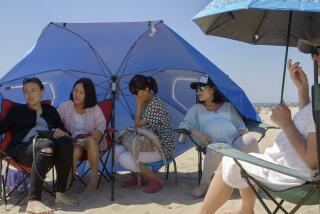Taiwanese Abortion Debate Blends Modern Values and Folk Beliefs : Buddhism: A Taipei temple is in charge of hundreds of infant ghosts as growing numbers terminate pregnancies.
- Share via
TAIPEI, Taiwan — Tsai Sung-Hui, pastor of one of Taipei’s most popular Buddhist temples, is personally in charge of hundreds of infant ghosts.
His Mercy Temple offers help to the growing number of Taiwan women who have taken the painful decision to abort a pregnancy: For a fee it will care for the souls of the aborted babies and ensure that they do not return to haunt their mothers.
The temple says its “baby spirit” program helps handle a supernatural problem created by Taiwan’s headlong rush to “modernity”; as more women shrug off traditional ideas about sex, the abortion rate has skyrocketed.
But Tsai’s temple has created a rare debate in Taiwan’s normally serene Buddhist community, as nuns and scholars accuse him of using religion to cheat distraught women.
“He tries to terrorize women,” said Chao Hui, a Buddhist nun who has led the drive against the Mercy Temple. “He uses their feelings of sorrow and guilt to make money.”
The argument over “baby spirits” is typical of modern Taiwan, where age-old folk beliefs exist side by side with the latest technology.
Businessmen take care to position their computers in such a way as not to offend the gods, and secretaries from air-conditioned office blocks scurry to temples on their lunch break to light incense.
Baby spirits are not new to Taiwan’s believers, but reports of hauntings have become more common as the abortion rate rises.
Taiwan legalized abortion in 1985.
The Taipei Family Planning Center said 110,000 abortions were registered last year on the island of 20 million people, many of whom are too embarrassed to buy contraceptives.
Vincent Kang, secretary of the center, said the real number of abortions is probably higher because many private clinics and doctors do not report abortions to health authorities. “We can definitely say abortion is on the rise,” he said.
He added, “People still have problems with it. Otherwise, why would there be all this fuss about baby spirits?”
According to the Mercy Temple, the spirits of aborted babies harass the living in a number of ways, ranging from disturbing sleep with spectral cries to ruining business deals, souring love affairs and prompting suicides.
“Because they are not properly cared for, infant spirits cannot be reincarnated and turn hateful. They often cause troubles in the material world,” the temple said in one of its advertisements.
People who fear they are being plagued by baby spirits have a number of options. Many women simply hope that contributions to the Mercy Temple will placate the ghosts and solve their problems.
For a fee of $110 the temple will name the “unborn child,” light incense for its soul twice a day and hold special religious services four times a year.
Some people, however, find spirit babies more expensive. One Taipei executive in a high-technology company felt it necessary to rent an apartment to house the ghosts of several unborn children he believed were preventing his wife from conceiving again.
Taiwan’s Buddhist Establishment has taken pains to distance itself from the Mercy Temple, saying “baby spirits” are not part of traditional Buddhist doctrine.
“(This) is not only not a part of local belief, it actually conflicts with local belief,” Chang Hsun, a researcher at Academica Sinica, wrote in an essay.
“They are twisting the Buddhist concept of reincarnation. . . . They are oversimplifying the whole issue of life and death,” said Chao, an officer of the Buddhist Assn. of the Republic of China.
Tsai resists the strict interpretation.
“Who is to say what is Buddhist? There are many different kinds of Buddhism,” he said in a brief telephone interview before hanging up.
More to Read
Sign up for Essential California
The most important California stories and recommendations in your inbox every morning.
You may occasionally receive promotional content from the Los Angeles Times.













